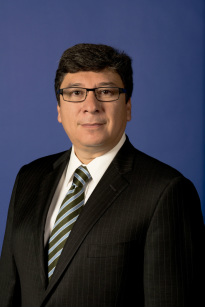Short Bio
René Zenteno is currently professor of Sociology and Demography and Faculty Senate Chair at the University of Texas at San Antonio.
He was the first vice provost for international initiatives at UTSA. During this time he was also the founding executive director of ConTex, a joint initiative of the University of Texas System and Mexico’s National Council of Science and Technology (CONACYT). As vice provost, he led efforts to advance the global profile and reputation of UTSA by: more than doubled the number of students participating in educational abroad experiences; expanding UTSA research collaborations and exchange programs for faculty and students with top ranked universities in Latin America, particularly Mexico, Brazil and Chile, as well as China, Japan, India, France and Germany; leading the first accreditation of UTSA’s Intensive English Program; and adopting streamlined procedures for travel to restricted regions. As executive director of ConTex, Zenteno spearheaded the launch of a $16 million five-year investment committed to fostering collaboration between the United States and Mexico through graduate training, research and discovery.
Zenteno served as the Under Secretary in the Ministry of the Interior in Mexico from 2010-2012. As Under Secretary, he oversaw all policies, programs and activities related to population, migration, and religious affairs. He was instrumental in writing, negotiating and enacting the 2011 Mexican Immigration Law. He also helped pass the Law on Refugees and Complementary Protection. These legal instruments provide basic rights to migrants and refugees in Mexico regardless of immigration status.
Prior to joining the UTSA faculty, Zenteno served as provost and professor at El Colegio de la Frontera Norte and as executive director of the Center for U.S.-Mexican Studies at the University of California, San Diego. He also spent eight years on the faculty of the Monterrey Institute of Technology and Higher Education.
Over the span of his academic career, Zenteno has procured 6.5 million dollars in grants, and has authored more than 50 publications. Zenteno has received several professional honors, including the Hispanic Association of Colleges and Universities' (HACU) Academia de Liderazgo Fellowship, President of the Mexican Society of Demography (SOMEDE) and membership in the National Academy of Science of Mexico. He is a recipient of the Alfonso Reyes Chaire of the Institut des Hautes Etudes de l'Amérique latine at Université de la Sorbonne Nouvelle Paris III and Chaire des Amériques of the Université de Rennes.
Zenteno has published widely in the areas of social and demographic change, international migration, and social inequality, with a focus on Mexico, U.S.-Mexican migration, and Mexican immigrant incorporation. Zenteno’s articles have been published in the Proceedings of the National Academic of Sciences, Social Problems, Journal of Development Economics, Latin American Research Review, International Migration Review, The Annals of the American Academy of Political and Social Science, Journal of Marriage and the Family, American Economic Journal: Applied Economics, Estudios Demográficos y Urbanos, Frontera Norte, and other academic journals.
Zenteno earned his bachelor’s degree in communications from Monterrey Institute of Technology and Higher Education, and his master’s degree in demography from El Colegio de Mexico. His doctorate is from the University of Texas at Austin in sociology and demography. He completed a two-year postdoctoral fellowship at the University of Pennsylvania.
Research Interests
Migration is a major demographic force shaping the social, economic, political and cultural life of the United States and Mexico. Most of my research falls into three categories: 1) U.S.-Mexican migration, with special emphasis on its determinants and consequences for sending and receiving regions and immigrant adaptation, 2) immigration policy, undocumented migration and human rights and 3) social and demographic change in Mexico, including social mobility and family behavior. Underlying these foci is a common interest in issues of inequality, development, and stratification. A key tenet of my research is that social disparities in Mexico and the U.S. can be better understood by establishing comparisons between the two countries. This approach is relevant because millions of Mexicans today are shaping their life opportunities and those of their descendants by moving between two societies with clear divisions based on class and ethnicity. In order to understand the social inequality faced by Mexicans in both countries, I argue that we need to produce more systematic and comparable data and research on how characteristics of the family of origin are associated with educational, health and labor market outcomes on both sides of the border.
René Zenteno is currently professor of Sociology and Demography and Faculty Senate Chair at the University of Texas at San Antonio.
He was the first vice provost for international initiatives at UTSA. During this time he was also the founding executive director of ConTex, a joint initiative of the University of Texas System and Mexico’s National Council of Science and Technology (CONACYT). As vice provost, he led efforts to advance the global profile and reputation of UTSA by: more than doubled the number of students participating in educational abroad experiences; expanding UTSA research collaborations and exchange programs for faculty and students with top ranked universities in Latin America, particularly Mexico, Brazil and Chile, as well as China, Japan, India, France and Germany; leading the first accreditation of UTSA’s Intensive English Program; and adopting streamlined procedures for travel to restricted regions. As executive director of ConTex, Zenteno spearheaded the launch of a $16 million five-year investment committed to fostering collaboration between the United States and Mexico through graduate training, research and discovery.
Zenteno served as the Under Secretary in the Ministry of the Interior in Mexico from 2010-2012. As Under Secretary, he oversaw all policies, programs and activities related to population, migration, and religious affairs. He was instrumental in writing, negotiating and enacting the 2011 Mexican Immigration Law. He also helped pass the Law on Refugees and Complementary Protection. These legal instruments provide basic rights to migrants and refugees in Mexico regardless of immigration status.
Prior to joining the UTSA faculty, Zenteno served as provost and professor at El Colegio de la Frontera Norte and as executive director of the Center for U.S.-Mexican Studies at the University of California, San Diego. He also spent eight years on the faculty of the Monterrey Institute of Technology and Higher Education.
Over the span of his academic career, Zenteno has procured 6.5 million dollars in grants, and has authored more than 50 publications. Zenteno has received several professional honors, including the Hispanic Association of Colleges and Universities' (HACU) Academia de Liderazgo Fellowship, President of the Mexican Society of Demography (SOMEDE) and membership in the National Academy of Science of Mexico. He is a recipient of the Alfonso Reyes Chaire of the Institut des Hautes Etudes de l'Amérique latine at Université de la Sorbonne Nouvelle Paris III and Chaire des Amériques of the Université de Rennes.
Zenteno has published widely in the areas of social and demographic change, international migration, and social inequality, with a focus on Mexico, U.S.-Mexican migration, and Mexican immigrant incorporation. Zenteno’s articles have been published in the Proceedings of the National Academic of Sciences, Social Problems, Journal of Development Economics, Latin American Research Review, International Migration Review, The Annals of the American Academy of Political and Social Science, Journal of Marriage and the Family, American Economic Journal: Applied Economics, Estudios Demográficos y Urbanos, Frontera Norte, and other academic journals.
Zenteno earned his bachelor’s degree in communications from Monterrey Institute of Technology and Higher Education, and his master’s degree in demography from El Colegio de Mexico. His doctorate is from the University of Texas at Austin in sociology and demography. He completed a two-year postdoctoral fellowship at the University of Pennsylvania.
Research Interests
Migration is a major demographic force shaping the social, economic, political and cultural life of the United States and Mexico. Most of my research falls into three categories: 1) U.S.-Mexican migration, with special emphasis on its determinants and consequences for sending and receiving regions and immigrant adaptation, 2) immigration policy, undocumented migration and human rights and 3) social and demographic change in Mexico, including social mobility and family behavior. Underlying these foci is a common interest in issues of inequality, development, and stratification. A key tenet of my research is that social disparities in Mexico and the U.S. can be better understood by establishing comparisons between the two countries. This approach is relevant because millions of Mexicans today are shaping their life opportunities and those of their descendants by moving between two societies with clear divisions based on class and ethnicity. In order to understand the social inequality faced by Mexicans in both countries, I argue that we need to produce more systematic and comparable data and research on how characteristics of the family of origin are associated with educational, health and labor market outcomes on both sides of the border.

